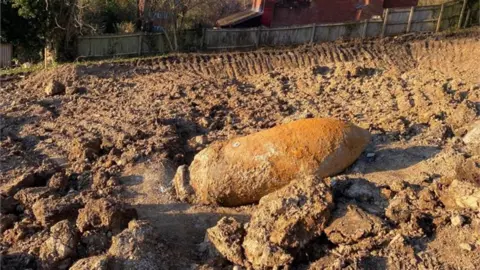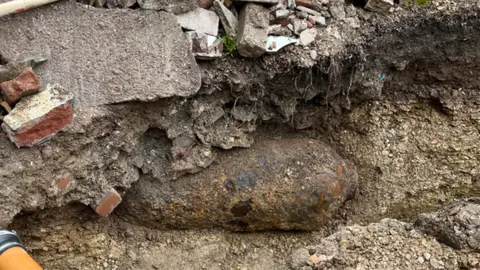Plymouth and Exeter WW2 bombs handled differently - MP
 Ministry of Defence/PA Wire
Ministry of Defence/PA WireAn MP has called on the Ministry of Defence (MoD) to explain why unexploded World War Two bombs in Plymouth and Exeter were dealt with differently.
A device found in Plymouth was moved and detonated at sea last week while a controlled detonation on site in Exeter in 2021 left several buildings damaged.
Labour's Ben Bradshaw said people were "entitled" to see an unreleased MoD report into the Exeter explosion.
The MoD said operations were dealt with on a case-by-case basis.
More than 10,000 people were evacuated from the Keyham area of Plymouth on Friday to allow a 500kg (1,102lb) device to be moved and made safe.
About 3,250 people initially had to move out of their homes for several days when the bomb was found on Tuesday.
The discovery prompted "one of the largest UK peacetime evacuation operations", according to the MoD.
In Exeter, more than 2,600 households and 12 university halls of residence were cleared before a 1,000kg (2,200lb) device was destroyed in situ next to the University of Exeter's Streatham campus on 27 February 2021.
It left a crater about the size of a double-decker bus and pieces of debris hit buildings and some properties within a 100m (330ft) exclusion zone, police said at the time.
 FPS Images
FPS ImagesMr Bradshaw said the Exeter explosion was "bigger than expected and did considerable damage".
He also said he was "never given a satisfactory explanation" as to why an MoD report into the Exeter incident was never publicly published.
He said: "My constituents are entitled to see that report."
Mr Bradshaw added: "I'm going back to the MoD to ask for an explanation as to why the two bombs were handled differently.
"There is also the wider issue that I'm afraid that this is not the last time we're going to uncover World War Two bombs."
Both cities suffered multiple German bombing raids during the war.
A MoD spokesperson said: "Due to the classified nature of Explosive Ordnance Disposal (EOD) incident reports, they are not routinely shared beyond operational partners.
"We treat each EOD operation on a case-by-case basis. The preferred solution is to make the bomb stable enough to move to a safe area for destruction, however with the Exeter EOD, that option was deemed unsafe."

Follow BBC Devon on X (formerly Twitter), Facebook and Instagram. Send your story ideas to [email protected].
